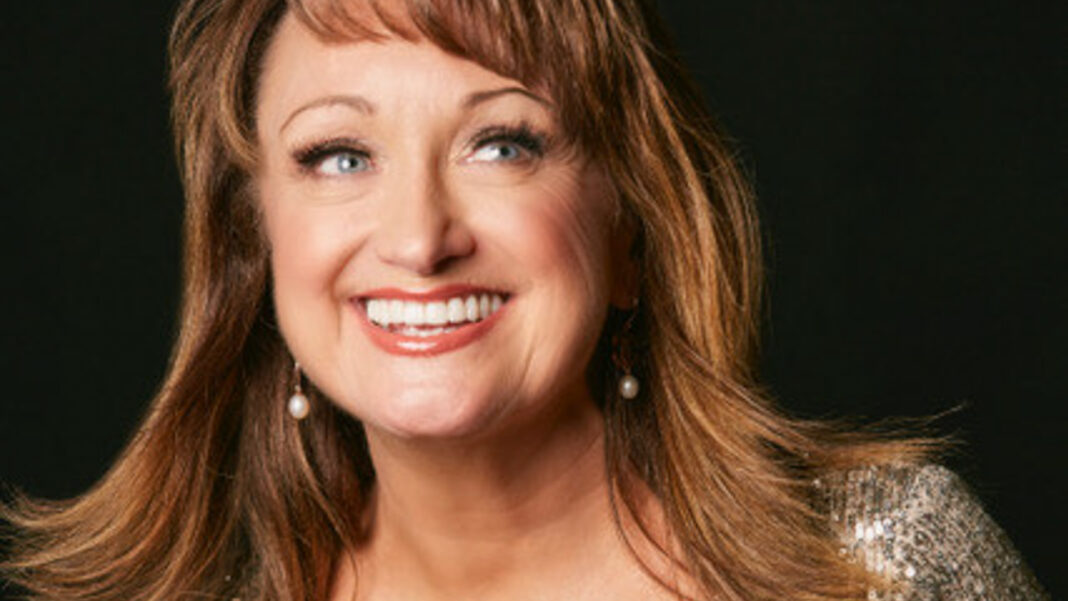Caroline O’Connor has had a very successful stage career. She’s played some of the biggest and best-known roles in musicals including Velma Kelly in Chicago; Reno Sweeney in Anything Goes; Mrs. Lovett in Sweeney Todd; Mama Rose in Gypsy; Cassie in A Chorus Line and Mabel in Mack & Mabel (for which she received an Olivier nomination).
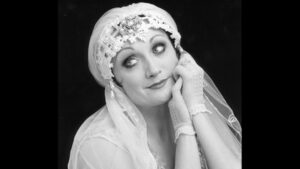
If the last show isn’t as familiar to you as the first five, composer Jerry Herman (Hello, Dolly!) considered it his best show. Even though it includes a slew of some of his finest songs, the show has struggled to be successfully produced. The original Broadway production (with Robert Preston and Bernadette Peters) ran for just 66 performances and won none of the eight Tony nominations it had received.
Mack & Mabel, which is centered around silent film director Mack Sennett and silent film star Mabel Normand, is being performed in a concert presentation this weekend at North Hollywood’s El Portal Theatre. This All Roads Theatre Company production is being directed and choreographed by Scott Thompson. O’Connor is playing Lottie Ames, a film star who takes Mabel (Jenna Lea Rosen) under her wing. Dermot Mulroney plays Mack. Update: All performances of Mack & Mabel have sold out.
Last week I spoke with O’Connor about the reasons why Mack & Mabel hasn’t been successful, how the show is a throwback to when stars were the stars of the show and if time heals everything O’Connor has gone through in her career. What follows are excerpts from our conversation that have been edited for length and clarity. To see the full interview with O’Connor, please go to our YouTube channel.
Q: Jerry Herman said that Mack & Mabel was his favorite of all of his works, but it was sadly his least successful. You were in the 1995 UK production for which you received an Olivier nomination for your performance as Mabel. Why do you think historically this show didn’t find an audience and what did the audiences miss by not seeing it?
We ran for about seven months, maybe a little bit more, which I think is probably the longest run of Mack & Mabel. I think that theater is quite often like fashion. I think it opened around 74, didn’t it? Weren’t we getting things like A Chorus Line and more modern musicals, maybe even Chicago? Those sorts of shows [meaning Mack & Mabel] seemed more like a revival. Whereas the modern shows like A Chorus Line, Godspell and things like that, it was just fashion and theater was changing. I just really believe that sometimes you see six revivals in a row. Suddenly that’s the thing and then suddenly brand new musicals. So I just think maybe the timing wasn’t quite right.
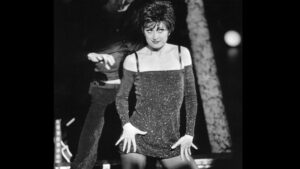
Mack & Mabel shares something in common with Stephen Sondheim‘s Merrily We Roll Along. They have both been considered shows with many of their composer’s best songs. But until this season’s Broadway revival of Merrily We Roll Along, the show wasn’t fully embraced. Late in the second act of Mack & Mabel there’s a song, I Promise You a Happy Ending. Mack sings, “If you’ve had a bad beginning, you’ll come out winning in the close.” Do you think Mack & Mabel will ultimately have a happy ending the same way Merrily We Roll Along has?
Possibly. I mean, of all the places to do this show, Los Angeles is probably the right place. Just because of the subject matter, it being about a movie director in a movie studio. If we can’t do it here and for it to be understood and appreciated, then it’s difficult to know. I think it could be a show like those that come around and people go, wait a minute. This is a sensational. An amazing score. It’s been criticized quite a bit over the years, but I have to say Scott is doing a really sensational job of the show now.
Jerry Herman was still with us when you did the 1995 production. Was Jerry Herman around during that production?
He came to Leicester to be with us during the rehearsal period. Which you can imagine was absolutely thrilling. There’s nothing quite like having the the actual composer in the room. He just had the biggest grin on his face the entire time he was there. I think he was just so thrilled to be seeing the musical come back to life. Then opening night, in London, he was there and it was everything you could possibly dream up.
This 1995 production had the most major changes in the book.
We had quite a few changes during the rehearsal period. Quite a few went into the show. There was a slight nervousness about how it would be received. I just think it’s best to just tell the truth. You know, the real story. It’s not a happy ending. Mabel Normand had a pretty tragic life at the end and died very young. Their love was never what it probably should have or could have been. So there was a lot of tweaking backwards and forwards and everyone was very nervous.
What do you think your perspective was on Lottie Ames in 1995 and how has it shifted now that you’re taking on this role?
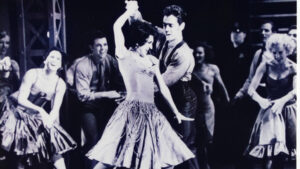
We had a wonderful actress called Kathryn Evans who played the role. She had a voice from heaven and was a wonderful dancer. So my recollection of the role is that it was brilliantly done by her, but also a lovely role. What I like about this female character within the show is that quite often you’ll have two female characters sort of against each other or competing with each other. I think it’s quite interesting in this show that Lottie becomes quite protective and supportive of Mabel. So it’s quite nice to have that sort of dynamic between the characters and it’s interesting.
I really enjoy playing her now just because I love the show. It’s so strange. Everything’s flooding back in the room. [I’m] getting quite emotional thinking about it because it was such a great time of my life. So I feel blessed that I’m getting to experience it again, but also to play this other role.
Lottie’s second act number is Tap Your Troubles Away. What do you do to get over your troubles?
I’m never happier than I am when I’m at work. When I’m at home I do tend to sing around the house. I’ve got a little miniature poodle and she’ll sing along with me, howl along with me. I live in Queensland, which is like God’s back garden. So I spend a lot of time with lovely friends. But I’d have to say what makes me happiest is when I’m actually working.
You had previously done a concert version of Mack & Mabel in Melbourne in 2001. You also did a concert version of My Favorite Year at 54 Below in 2017. What are the differences for you as an actor in doing a concert performance as opposed to a fully realized production?
I don’t think it’s that different, to be honest with you. I think you approach it in the same way. You still try to find a full-bodied character. Of course, there’s not as much choreography when you do it in that way. But you have to do a lot of the learning in advance.
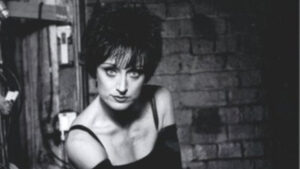
You’ve played Cassie in A Chorus Line. You’ve played Phyllis in Follies. Some of the greatest musicals that we’ve ever had came out of the 1970s. Do you think that musicals from that time offer performers and audiences more than perhaps musicals do today?
Yes I do. I can’t really put my finger on it. When I moved to England in the 80s, I really noticed that star vehicles were not the important issue anymore. It was that the show was becoming the star. Not the roles that you aspire to play. I do think that we got to the end of the 70s and they stopped writing things in that capacity. Which is a shame, because it gave you something to aspire to. I’ve always grown up going, oh my God, I would love to play that part that so-and-so played. So yeah, I think the fashion definitely changed. And the roles, even though they were still important, they weren’t seen in the same capacity anymore.
You mentioned roles that you’d like to play based on who else had played them. What are those roles?
I did Gypsy and I loved Ethel Merman growing up. When I was a little girl growing up in Australia, I was probably about 11, I’ve got a cassette of me singing Rose’s Turn with Ethel. It’s funny to me because I didn’t want to play Baby June. Obviously I want to play Mama Rose. I just loved the sound. And I remember thinking, that must be what Broadway is, because I didn’t know what Broadway was. I used to listen to the albums and think that sound, that big orchestra, and you could hear the character coming across. I couldn’t see them, but I could tell every emotion. Of course, Angela Lansbury in probably everything. And Chita Rivera, of course, probably my greatest inspiration, because she was also such a magnificent dancer. I did four of her shows: West Side Story, Chicago, The Rink and Kiss of the Spider Woman. The dream is that you get to create a role that somebody else would like to play in the future.
You also had the distinction of having been in Baz Luhrmann’s Moulin Rouge! as Nini. Which means you got Tango Roxanne as your big on-screen moment. Why do you think Moulin Rouge! resonates with people as strongly as it does?
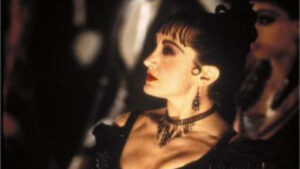
The music primarily has to be part of it because of the recognition. Everybody feels comfortable when they hear something that they recognize. The experience for me was one of the best of my life. Very unexpected thing that happened, too. I didn’t think at that stage of my life as a dancer, because I was in my late 30s, that I was going to get the call to do something like that. I don’t think we’d seen a musical movie in quite some years. He brought them back into fashion again.
You’ve been doing this for four decades at this point, which means you’ve had good times and bum times and you’ve seen it all. When you look back on your career, does time heal everything that wasn’t so great and offer perspective on those things that were?
Yes, I think so. I remember the George Burns quote, which was that show business is a hideous bitch goddess. And I thought, that’s so true because you love it. It’s very hard work. It can be very disappointing as well. You have to hang in there. You never who’s going to produce what. There’s no plan. You just always have to be ready to be prepared and to be able to go for something. So I think that time does heal everything. Sometimes you have great disappointments. I know over the years you think, gosh, why didn’t I get to do that? And then something else marvelous to come along. So, yes, the unexpected is always a wonderful surprise. This certainly was an unexpected surprise. So may they long continue.
To see the full interview with Caroline O’Connor, please go here.
Main Photo: Caroline O’Connor (Courtesy Caroline O’Connor)











